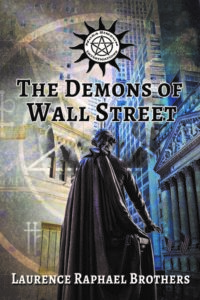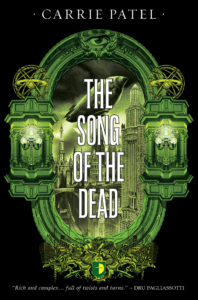In my romantic-noir urban fantasy novella The Demons of Wall Street, magic and the existence of demons are secrets kept hidden from most people. Only a relatively small number of sorcerers, bankers, and their agents are in on the conspiracy, on the order of thousands of people worldwide.
 The premise of magic-done-only-in-secret is not exactly an original conceit, and indeed it has become so familiar over not just years but generations of fantasy literature that it is hardly something to be questioned when it appears. It’s a convenient explanation for how magic can possibly exist in our familiar and ostensibly non-magical world.
The premise of magic-done-only-in-secret is not exactly an original conceit, and indeed it has become so familiar over not just years but generations of fantasy literature that it is hardly something to be questioned when it appears. It’s a convenient explanation for how magic can possibly exist in our familiar and ostensibly non-magical world.
Still, the idea of a very widely-kept secret to which thousands of people are privy may seem rather implausible. Surely someone would let the information slip? But as it happens, there are quite a few historical examples of widely-held secrets that were kept so well we aren’t sure what the truth of them was anymore.
I refer you first to the mystery cults of the classical world. In ancient Greece, and subsequently throughout the Hellenized and then the Romanized world, a great many people subscribed to the mystery cults of Eleusis, Samothrace, and (in Roman times) Mithras, among others. These cults required terrible binding oaths from their aspirants, and in many classical-period cities, substantial percentages of the middle and upper classes were members. But we don’t know, apart from a few scattered hints, what the cults believed, what their rituals were, or how members were expected to recognize and support one another outside of the ritual centers. It might be that the masonic phrase “I have seen the sun at midnight” was originally part of the Eleusinian mystery, which we know had something to do with the myth of Demeter and Persephone. But then again, that might be just wishful thinking on the part of the masons based on some modern invention. The names of the deities worshipped by cultists at Samothrace were forbidden to be uttered aloud, and while it’s believed they were mostly chthonic female members of the Greek pantheon, we really don’t know for sure. And even the cult of Mithras, to which millions of Roman legionaries and a great many other citizens belonged (including the emperor Julian the Apostate) is almost opaque to us now. There was probably the sacrifice of a bull involved at some point, but we know very little more than that of their beliefs and practices.
In any event, during this period of around 2,000 years (1600 BCE to 400 CE), everyone was well aware of the existence of the mystery cults, but the members kept their secrets quite effectively, as hardly a scrap of period writing survives that reveals any of their hidden knowledge; indeed, even elliptical references and allusions are rare.
And so, through folk culture, literary memory, and possibly even through the survival of cult remnants outlawed by the Catholic Church, the idea of secret organizations, hidden rituals, and underground magical practice was passed into medieval and then modern times. Early Christianity often assumed the form of a secret cult during the time in which it was forbidden, and splinter groups such as the various gnostic sects became hard-to-extirpate heresies that survived well into the 1400s. These heretic cults changed form from time to time as individual groups were scattered or forced underground, but eventually many of their beliefs were incorporated into the nonconformist branches of Protestantism, and thus into some present-day sects.
There’s no era of recent European history in which secret organizations didn’t thrive, and in many cases, we have only vague knowledge of their dissemination and indeed of their actual beliefs and purposes. Consider for example the 18th century Illuminati, made famous by Robert Anton Wilson and Robert Shea’s gonzo novels starting with The Illuminatus! Trilogy published in 1975, and revived yet again on a more literary basis by Umberto Eco in Foucault’s Pendulum in 1988. It seems Adam Weisshaupt organized some quasi-masonic lodges in Bavaria and elsewhere that might have been political, might have been magical, or might just have been the Enlightenment equivalent of an old boys’ social club with a few secret forms and rituals thrown in for fun. Who knows, really? No one living. But even today we have quasi-secret organizations with wide membership like the various masonic groups, whose rituals are admittedly only officially secret. But there are also a great many more serious, smaller groups, including the various descendants of the Golden Dawn and the organizations founded by Aleister Crowley and his disciples, who include, at just one remove, L. Ron Hubbard. The bizarre pulp-science-fictional beliefs ascribed to Scientology’s elite, while no longer secret, are certainly consistent in style with their many predecessors.
Which brings us back to urban fantasy and its pervasive notion of magic performed in secret behind closed doors by organizations of oath-sworn initiates that any of us might trip over or better yet be invited to join.
Is this mere wish fulfillment? Escapism? Fantasies of power and transfiguration? Certainly. But these are fantasies with the most distinguished of heritages, wending their way back to ancient times, and given the imprimatur of the greatest writers and thinkers of antiquity one must concede there is a certain solemn majesty to the idea.
So if you read The Demons of Wall Street (first in a series, the sequel The Demons of the Square Mile will be out at the end of the year or early in 2021!), I do hope you’ll enjoy it; the novella’s purpose is entirely to entertain. But should the notion of a secret organization of sorcerers and financiers hiding in plain sight in the boardrooms of the great firms of Wall Street give you pause, consider this little essay as a preemptive justification of a grand conceit passed on from earliest antiquity all the way to the present day.
Buy the book here.
 BIO:Â Laurence Raphael Brothers is a writer and technologist. He has worked in R&D at such firms as Bell Communications Research and Google, and he has five patents along with numerous industry publications. His areas of expertise include Internet and cloud-based applications, artificial intelligence, telecom applications, and online games.
BIO:Â Laurence Raphael Brothers is a writer and technologist. He has worked in R&D at such firms as Bell Communications Research and Google, and he has five patents along with numerous industry publications. His areas of expertise include Internet and cloud-based applications, artificial intelligence, telecom applications, and online games.
He has published many science fiction and fantasy stories and is a member of Science Fiction and Fantasy Writers of America.
Find out more about Laurence Raphael Brothers on his website.
If you’re an author or other fantasy and science fiction creative, and want to do a guest blog post, please check out the guest blog post guidelines. Or if you’re looking for community from other F&SF writers, sign up for the Rambo Academy for Wayward Writers Critclub!





 Growing up, two of my favorite things were books and video games. If you’d told me twenty years ago that I’d grow up to write both, I probably would have choked on my Mountain Dew.
Growing up, two of my favorite things were books and video games. If you’d told me twenty years ago that I’d grow up to write both, I probably would have choked on my Mountain Dew.



